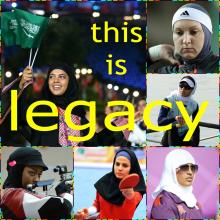vanguards
Dozens of Muslim women are competing at the 2012 Summer Olympics in London — several of them as the very first female athletes chosen (and allowed) to represent their countries in the Olympic games.
These women are vanguards, shattering stereotypes, subverting cultural-religious mores, and creating a legacy that will benefit female Olympians of all creeds for years to come.
As has been widely reported and celebrated (in many quarters), Saudi Arabia sent two women athletes to represent the Arabic nation for the first time at the Olympic games — 16-year-old judoka (judo competitor) Wodjan Ali Seraj Abdulrahim Shahrkhani and 800-meter runner Sarah Attar, 19.
Attar, who is a California-born American but holds dual-citizenship in the Arabian kingdom because her father is Saudi, trains in San Diego, not far from Pepperdine University where she is a junior art major and also runs on the university's track team.
Shahrkhani, whose father is a judo coach and an international referee in the sport, won a dispute with Olympics officials earlier this week to be allowed to compete while wearing her hijab or traditional head covering worn by many observant Muslim women.
Saudi Arabia is not the only majority Muslim country sending its first women competitors to the Olympics. Brunei and Qatar also followed suit, sending five female athletes in total. Runner Maziah Mahusin is the lone woman on Brunei's three-person Olympic team. Qatar's four women Olympians are swimmer Nada Mohammed WS Arakji, sprinter Noor Hussain Al-Malki, table tennis player Aia Mohamed, and air rifle competitor Bahia Al-Hamad.
Both Mahusin and Al-Hamad were chosen as flag bearers for their nations at the opening ceremonies in London last week. Twelve majority Muslim countries — Tajikistan, Qatar, Morocco, Indonesia, Turkey, Jordan, Iraq, Djibouti, Comoros, Brunei, Bahrain, and Albania — chose women as flag bearers at the opening ceremonies that were viewed by an estimated 1 billion people worldwide.
